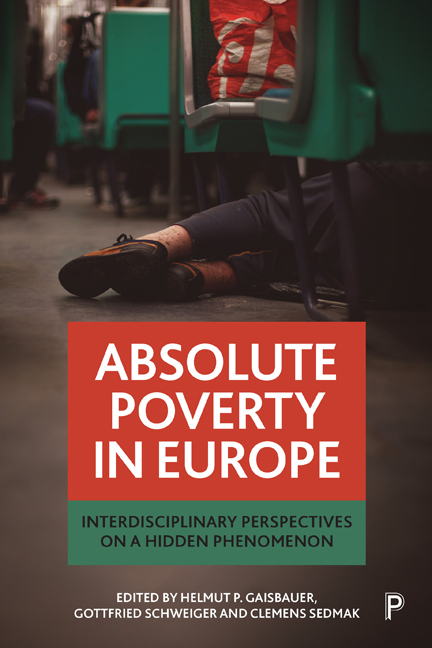Book contents
- Frontmatter
- Contents
- List of figures and tables
- Notes on contributors
- 1 Absolute poverty in Europe: introduction
- Part One Conceptual and methodological challenges
- Part Two Key issues for the absolute poor
- Part Three Policy responses to absolute poverty in Europe
- Part Four Ethical perspectives on absolute poverty in Europe
- Conclusion responding to the dark reality of absolute poverty in European welfare states
- Index
11 - High accompaniment needs: absolute poverty and vulnerable migrants
Published online by Cambridge University Press: 27 April 2022
- Frontmatter
- Contents
- List of figures and tables
- Notes on contributors
- 1 Absolute poverty in Europe: introduction
- Part One Conceptual and methodological challenges
- Part Two Key issues for the absolute poor
- Part Three Policy responses to absolute poverty in Europe
- Part Four Ethical perspectives on absolute poverty in Europe
- Conclusion responding to the dark reality of absolute poverty in European welfare states
- Index
Summary
Introduction
Every week hundreds of migrants who leave their home country arrive in Europe. Emma Jane Kirby, in her novel The Optician of Lampedusa, tells the story of a citizen from Lampedusa who lives a quiet life as an optician in this Italian island town and is all of a sudden, while on a boat trip with friends, confronted with the reality of migrants drowning in the sea. He is surrounded by desperate persons: ‘Everywhere he looked, there were more of them! They seemed to multiply in the water, hands breeding hands’ (Kirby, 2016: 35). He took as many people as he possibly could onto his boat, the Galata, ‘he knew it was too many. From his vantage point he did a rapid head count. One, two, twenty … forty-six men and one woman. Plus eight crew. That meant there were fifty-five of them. Fifty-five on a boat built for a maximum of ten’ (Kirby, 2016: 38). And still there were more and more people fighting for their lives. ‘There are too many of them. Too many of them and I don't know how to do this’ (Kirby, 2016: 3).
The despair and absolute poverty of migrants pushes well-situated persons into situations of confusion and exhaustion. Many migrants arrive with next to nothing, sometimes barely with their lives, and naked; sometimes they do not arrive at all. Those who survive will begin their lives in Europe in desperate circumstances, in need of food, shelter and clothing. They arrive in absolute poverty, fighting for their mere survival; they have nothing. They cannot provide anything on their own, not food, not shelter, not clothing. In order to meet their basic needs they require institutional support. Even though one is well-advised to see African migrants as agents and not only as victims or recipients, there is not the slightest doubt that the routes of migration from Africa to Europe bring persons in absolute poverty into the European Union.
Danish anthropologist Dan Lucht has been researching the reasons, causes, ways and consequences of migration from Africa to Europe. Lucht describes the situation of African migrants in Naples, who depend upon soliciting irregular construction work, usually early in the morning, from an informal roadside marketplace.
- Type
- Chapter
- Information
- Absolute Poverty in EuropeInterdisciplinary Perspectives on a Hidden Phenomenon, pp. 229 - 246Publisher: Bristol University PressPrint publication year: 2019



